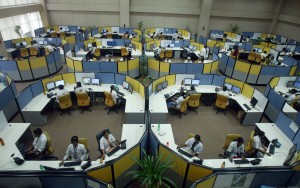DAVOS: Showcasing the potential of India at the World Economic Forum (WEF) in Davos, leading industry stalwarts stressed on the huge employment opportunities available in India due to the potential of a young workforce. Around 65 percent of India’s population is below the age of 35. With a new WEF study warning about a net loss of over five million jobs in next five years due to the fourth industrial revolution, Infosys CEO Vishal Sikka said there are huge employment opportunities in India but there is a need to impart right skills and training.
The WEF study titled ‘The Future of Jobs’, focused on 15 leading developed and emerging economies including India, said the employment outlook is net positive in only five of these countries. Speaking at a session on ‘The Promise of Progress’ on the job market impact of the fourth industrial revolution, the CEO of the IT giant Infosys, Mr Sikka said there would certainly be disruptions but the new technology would not necessarily create imbalances. He said if the right kind of education, connectivity and training is provided to the people, the imbalances could be reduced.
“There was a big startup event this weekend and it showed there are huge opportunities available in India. Do we prepare people for where the world is going to be? We need to impart skills. There has to be disruptions. It should be about what the world is going to be and not what the world used to be,” Mr Sikka added.
Sectors with potential
The improved job market has renewed optimism particularly in the banking, financial services and insurance (BFSI) sector. According to a report by leading online job portal monster.com, in September 2015, online recruitment in the sector was 85 percent higher than a year-ago and the pace of growth y-o-y has been improving consistently.
With the government pushing for ‘Make in India’ and the plan to create 100 smart cities, it is expected to increase hiring in manufacturing and commerce as well as in the infrastructure sector.
Fourth Industrial Revolution
Dismissing suggestions that the new technology and connectivity would create imbalances, Mr Sikka said, “If we take a longer and deeper view, the more people have access to jobs, there is more likelihood that the imbalances will go away. Stressing on connectivity being viewed as a human right, he said, “if we equip people in the right way, there is no need to worry”.
“I am convinced the longer term solution in education, connectivity and creating right skills. What we need to do is promote entrepreneurship and put in place right kind of policies,” Mr Sikka added.
Discussions on the Fourth Industrial Revolution would focus on the ongoing transformation of society and economy through cutting-edge technology and innovations. It would focus on the progress made in artificial intelligence, robotics, autonomous vehicles, 3-D printing, nanotechnology and other areas of science.
Author Profile
- India Writes Network (www.indiawrites.org) is an emerging think tank and a media-publishing company focused on international affairs & the India Story. Centre for Global India Insights is the research arm of India Writes Network. To subscribe to India and the World, write to editor@indiawrites.org. A venture of TGII Media Private Limited, a leading media, publishing and consultancy company, IWN has carved a niche for balanced and exhaustive reporting and analysis of international affairs. Eminent personalities, politicians, diplomats, authors, strategy gurus and news-makers have contributed to India Writes Network, as also “India and the World,” a magazine focused on global affairs.
Latest entries
 DiplomacyJanuary 5, 2026India walks diplomatic tightrope over US operation in Venezuela
DiplomacyJanuary 5, 2026India walks diplomatic tightrope over US operation in Venezuela India and the WorldNovember 26, 2025G20@20: Africa’s Moment – The Once and Future World Order
India and the WorldNovember 26, 2025G20@20: Africa’s Moment – The Once and Future World Order DiplomacyOctober 4, 2025UNGA Resolution 2758 Must Not Be Distorted, One-China Principle Brooks No Challenge
DiplomacyOctober 4, 2025UNGA Resolution 2758 Must Not Be Distorted, One-China Principle Brooks No Challenge India and the WorldJuly 26, 2025MPs, diplomats laud Operation Sindoor, call for national unity to combat Pakistan-sponsored terror
India and the WorldJuly 26, 2025MPs, diplomats laud Operation Sindoor, call for national unity to combat Pakistan-sponsored terror








